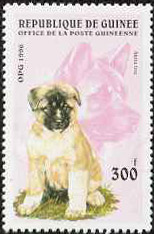
Clostridium difficile in faeces from healthy dogs and dogs with diarrhea
Clostridium dificile in dogs with diarrhoea might affect humans
Source: K.-J. Wetterwik, G. Trowald-Wigh, L.-L. Fernström, K. Krovacek (2013)
Acta Veterinaria Scandinavica, vol 55 no 1, March 2013, p23 doi: 10.1186/1751-0147-55-23
The bacteria Clostridium difficile can cause diarrhoea, and fever in humans, and may be life-threatening. Other animals can also be affected, though little is known about the extent to which pets may be affected. This Swedish study has tested for Clostridium difficile in dogs, through the analysis of faeces from 50 healthy dogs and 20 dogs suffering from diarrhoea, 18 of which were in hospital due to their illness. The dogs came from Stockholm-Uppsala region. Two of the healthy dogs, and two suffering from diarrhoea were found to be affected by Clostridium difficile.
Clostridium difficile strains affecting humans produce toxins, known as A and B. In addition, they have genes allowing for these toxins to be produced. The genes are called tcdA and tcdB. The samples from the healthy dogs in this study tested negative for both A and B toxins, as well as for the genes producing the toxins. The dogs with diarrhoea, however, tested positive for toxin B and for both tcdA and tcdB genes. Further testing, or ribotyping, revealed that the the toxigenic ribotype 014 (SE-type 21), associated with disease in humans, was present in the samples from the dogs with diarrhoea, while samples from the healthy dogs revealed a different ribotype. Usually these infections in dogs can be treated with antibiotics, but a sample from a healthy dog in this study initially showed resistance to metronidazole.
These results show that dogs may carry Clostridium difficile, and that dogs with diarrhoea can be infected with the toxigenic variety which also affects humans, so Clostridium difficile could cause diarrhoea in dogs, and these dogs might infect humans. More work is needed on the role of Clostridium difficile in canine gastrointestinal disease.
DO,HH


